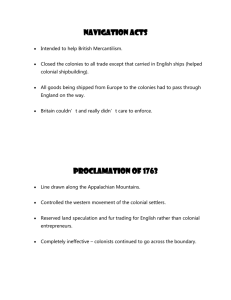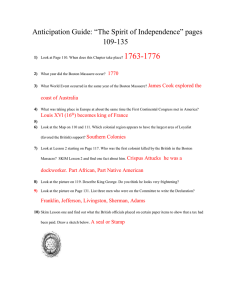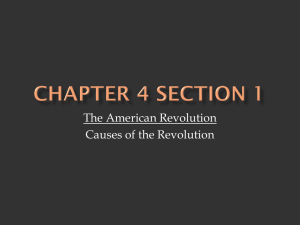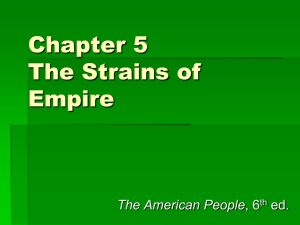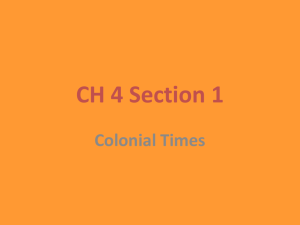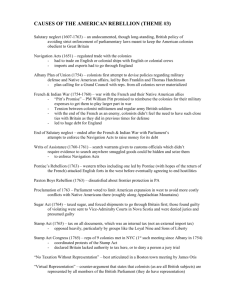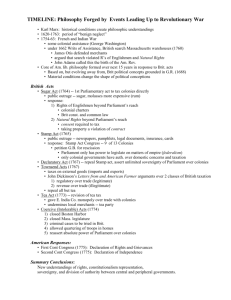Colonial Era STAAR Review Worksheet (1607-1776)
advertisement
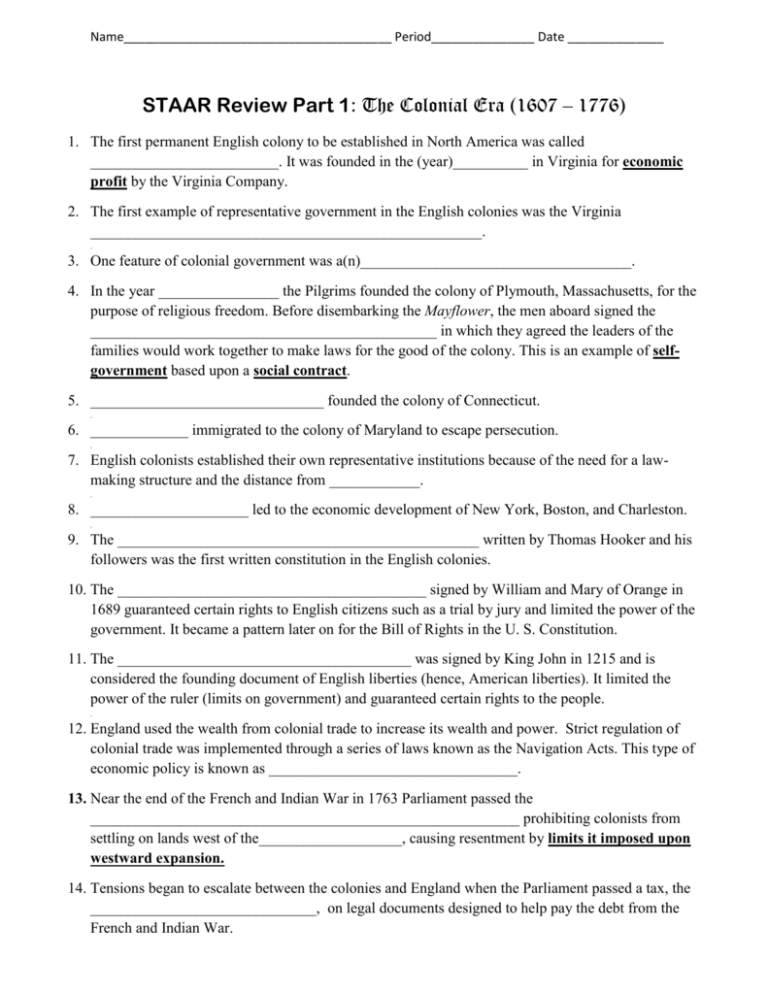
Name_______________________________________ Period_______________ Date ______________ STAAR Review Part 1: The Colonial Era (1607 – 1776) 1. The first permanent English colony to be established in North America was called _________________________. It was founded in the (year)__________ in Virginia for economic profit by the Virginia Company. 2. The first example of representative government in the English colonies was the Virginia ____________________________________________________. . 3. One feature of colonial government was a(n)____________________________________. 4. In the year ________________ the Pilgrims founded the colony of Plymouth, Massachusetts, for the purpose of religious freedom. Before disembarking the Mayflower, the men aboard signed the ______________________________________________ in which they agreed the leaders of the families would work together to make laws for the good of the colony. This is an example of selfgovernment based upon a social contract. 5. _______________________________ founded the colony of Connecticut. . 6. _____________ immigrated to the colony of Maryland to escape persecution. . 7. English colonists established their own representative institutions because of the need for a lawmaking structure and the distance from ____________. . 8. _____________________ led to the economic development of New York, Boston, and Charleston. . 9. The ________________________________________________ written by Thomas Hooker and his followers was the first written constitution in the English colonies. 10. The _________________________________________ signed by William and Mary of Orange in 1689 guaranteed certain rights to English citizens such as a trial by jury and limited the power of the government. It became a pattern later on for the Bill of Rights in the U. S. Constitution. 11. The _______________________________________ was signed by King John in 1215 and is considered the founding document of English liberties (hence, American liberties). It limited the power of the ruler (limits on government) and guaranteed certain rights to the people. . 12. England used the wealth from colonial trade to increase its wealth and power. Strict regulation of colonial trade was implemented through a series of laws known as the Navigation Acts. This type of economic policy is known as _________________________________. 13. Near the end of the French and Indian War in 1763 Parliament passed the _________________________________________________________ prohibiting colonists from settling on lands west of the___________________, causing resentment by limits it imposed upon westward expansion. 14. Tensions began to escalate between the colonies and England when the Parliament passed a tax, the ______________________________, on legal documents designed to help pay the debt from the French and Indian War. 15. Colonists protested the new taxes claiming they had no representation in Parliament. _______________________________________________________ became the basis for their protests. 16. Protest groups formed in the colonies such as the Sons of Liberty led by _________________________ who also helped to form committees of correspondence designed to unite the colonies and keep them informed as to the actions of the Parliament and the king. 17. __________________________ opposed British policies and was the lawyer who defended the soldiers accused in the Boston Massacre. He served later as our nation’s first vice-president and second president. 18. _________________________________ was an African American colonist who was killed in the Boston Massacre. 19. The _____________________________________________ was an act of civil disobedience led by the Sons of Liberty who were protesting the Tea Act passed by the British Parliament. 20. The ____________________________________________________ (also known as the Coercive Acts) were passed by Parliament in retaliation for the Boston Tea Party. The response to the laws by the colonists led them to create the First Continental Congress. Magna Carta TERMS Mayflower Compact Thomas Hooker English Bill of Rights Appalachian Mountains 1607 John Adams Intolerable Acts Proclamation of 1763 Stamp Act House of Burgesses Crispus Attucks 1620 Samuel Adams Boston Tea Party England Mercantilism Catholics No taxation without representation Jamestown Fundamental Orders of Connecticut Elected legislature Natural harbors


